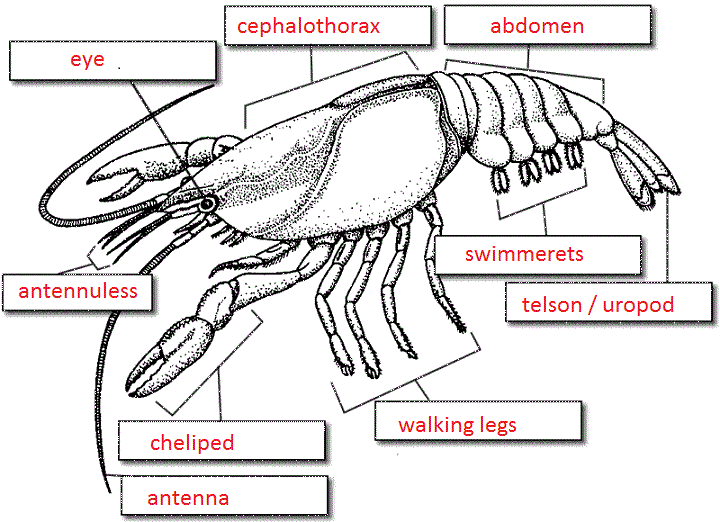The External Anatomy of the Crayfish KEY
Original Document: Crayfish External Anatomy
Prelab Questions:
1. Crayfish belong to the Kingdom
__Animalia____, the Phylum _____Arthropoda__________,
and the subphylum _______Crustacea______________________
2. List three characteristics that all arthropods share. exoskeleton, jointed appendages, segmented bodies
3. Name two other animals in the same phylum as a crayfish (related). crab, lobster, insects, spiders, etc...The Head:
Place the crayfish ventral side up
so the mouthparts can be observed. (Check each box upon completion)
4. Locate the 1st, 2nd, and 3rd maxillipeds. These appendages are used for manipulating
food. (The 3rd maxilliped is the largest and topmost one, the 2nd is underneath,
and the 1st is underneath the 2nd) ![]()
5. Locate the mandible which lies
underneath the maxillipeds. This structure should be hard and difficult to move.
The mandible of arthropods opens differently than the jaws of humans. ![]()
Describe the difference. ______________opens from side to side_____________________________
6. Locate the two large antennae
and the smaller antennules that branch from the base. The antennae are sense
organs (touch, taste, equilibrium) ![]()
7. Locate the eyes, which extend
from two stalks called pedicles. ![]()
The Body
8. The body of the crayfish consists
of a fused head and thorax: the cephalothorax. The cephalothorax is covered
by a thick armor called a carapace. Extending from the carapace is a pointy
structure called the rostrum. Locate the cephalothorax and rostrum. ![]()
9. The abdomen of the crayfish is
segmented and flexible. Bend the abdomen back and forth and observe how each
segment moves. ![]()
10. Count the number of segments
on the abdomen. Hint: bending it will show you were the segments are separated.
How many segments are on your crayfish? __7____
Compare this number to other crayfish, are they all the same? ___yes______ ![]()
The Appendages
11. Locate the chelipeds (the claws).
Gently manipulate the cheliped to determine the direction in which the appendage
can bend. How many joints are there on a single cheliped? ____3-4_____ ![]()
12. Cut the end of the cheliped off
and use the forceps to find the connective tissue inside. Pulling on this tissue
will make the claw open and close. Try it! ![]()
13. Behind the cheliped are four
pairs of walking legs. How many joints are on each leg? _4-5___![]()
14. Locate the swimmerets (appendages
attached to each segment of the abdomen). Are the swimmerets jointed? __no___
How many pairs of swimmerets are there? ____4__![]()
15. The last segment of the abdomen
(the 7th segment) is called the telson, and it is specialized for swimming.
Locate the two uropods extend from either side of the telson. ![]()
Determining the Sex of Your Crayfish
16. Look at the first pair of swimmerets
on your crayfish. If these swimmerets are considerably larger and stiffer than
the other swimmerets, you have a male. If the first swimmerets are about the
same size as the others, your crayfish is a female. What is the sex of your
crayfish? ____ ![]()
17. Measure the length of your crayfish
and compare it to other crayfish in the room to complete the table.![]()
|
Female Crayfish
(length in cm)
|
Male Crayfish
(length in cm)
|
| answers vary | |
| Average: | Average: |
Based upon your data, which sex of crayfish is the largest? _________males are larger______
18. Label the crayfish picture below.
![]()

